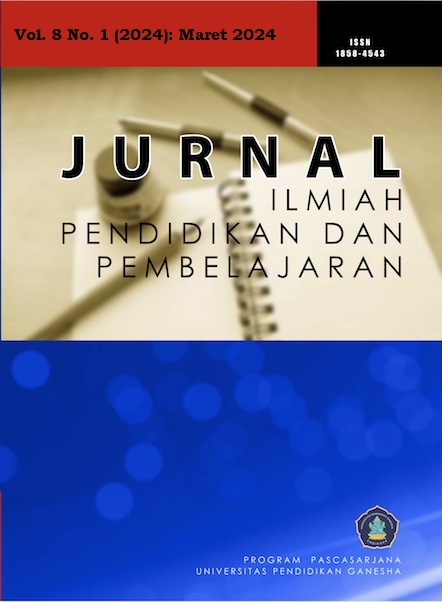School Management Model to Improve Teacher Performance in Elementary Schools
DOI:
https://doi.org/10.23887/jipp.v8i1.73725Kata Kunci:
School Management Model, Teacher Performance, Primary SchoolAbstrak
There is a needs analysis of low teacher performance. This research aims to analyze school management models to improve elementary school teacher performance. This research is a type of Research and Development (R&D) research, development is carried out referring to Borg & Gall's theory. The population of this research is elementary school teachers. The subjects in this research were 74 teachers. Data collection tools use valid and reliable test instruments. Data analysis techniques with quantitative and qualitative analysis. The results of the validity data analysis test show that the school management model developed is valid for use. The results of calculating data on attractiveness, convenience and usefulness obtained an average value of 88.35 with very practical criteria. The effectiveness of the management model developed can be seen from the average N-Gain score with medium criteria and the t test shows there is a significant difference in teacher performance. The research conclusion is that the school management model developed is valid and practical to use and effective in improving the performance of elementary school teachers. The implications of this research are that management models can facilitate teachers in improving performance.
Referensi
Anggraeni, A. N., Cikusin, Y., & Hayat. (2021). Pengaruh Penerapan Manajemen Kinerja Terdahap Produktivitas Pegawai. Jurnal Mediasosian : Jurnal Ilmu Sosial Dan Administrasi Negara, 5(1), 29–46. https://doi.org/10.30737/mediasosian.v5i1.1551.
Anjani, N. F., & Dafit, F. (2021). Peran Manajerial Kepala Sekolah Dalam Meningkatkan Mutu Pendidikan di Sekolah Dasar. MIMBAR PGSD Undiksha, 9(3), 481–488. https://doi.org/10.23887/jjpgsd.v9i3.40828.
Ariyani, R. (2017). Kepemimpinan Kepala Sekolah dalam Pengembangan Profesionalisme Guru. Jurnal Ilmu Keislaman Dan Peradaban, 5(1).
Cundari, L., Sari, K. F., & Anggraini, L. (2018). Batch Study, Kinetic and Equilibrium Isotherms Studies of Dye Adsorption of Jumputan Wastewater onto Betel Nuts Adsorbent. Journal of Physics: Conference Series, 1095(1). https://doi.org/10.1088/1742-6596/1095/1/012018.
Fernández-Batanero, J. M., Montenegro-Rueda, M., Fernández-Cerero, J., & García-Martínez, I. (2022). Digital competences for teacher professional development. Systematic Review. European Journal of Teacher Education, 45(4), 513–531. https://doi.org/10.1080/02619768.2020.1827389.
Fitri, F. (2019). Peran Kepala Sekolah Sebagai Supervisor Dalam Membina Profesionalisme Guru. Adaara: Jurnal Manajemen Pendidikan Islam, 8(1), 730–743.
Hastuti, P. I. D., Murniati, N. A. N., & Haryati, T. (2021). Manajemen Program Adiwiyata Di Sekolah Menengah Pertama Negeri 1 Mijen Kabupaten Demak. Jurnal Manajemen Pendidikan (JMP), 10(2). https://doi.org/10.26877/jmp.v10i2.9435.
Jimad, N., Yuningsih, Mardina, N., & Perdana, R. (2021). Educational Performance Management Model for Higher Education: Soft System Methodology Based Action Research Approach. International Business and Accounting Research Journal, 5(2), 143–157. https://doi.org/10.35474/ibarj.v5i2.201.
Kartika, N. K., & Ambara, D. P. (2021). Kompetensi Kepribadian dan Motivasi Mengajar Berpengaruh Terhadap Kinerja Guru PAUD. Jurnal Pendidikan Anak Usia Dini Undiksha, 9(3), 381–390. https://doi.org/10.23887/paud.v9i3.39952.
Lisnawati, R. (2017). Fungsi Manajemen Kepala Sekolah, Motivasi, dan Kinerja Guru. Jurnal Pendidikan: Teori Dan Praktik, 2(2). https://doi.org/10.26740/jp.v2n2.p143-149.
Meilani, H., Lubis, M. J., & Darwin, D. (2022). Implementasi Manajemen Berbasis Sekolah (MBS) di dalam Kepemimpinan Kepala Sekolah. Jurnal Basicedu, 6(3), 4374–4381. https://doi.org/10.31004/basicedu.v6i3.2840.
Pratiwi, N. L. A. M., & Negara, I. G. A. O. (2021). Kontribusi Kepemimpinan Kepala Sekolah dan Budaya Sekolah terhadap Kinerja Guru di SD. Jurnal Penelitian Dan Pengembangan Pendidikan, 5(1), 84–90. https://doi.org/10.23887/jppp.v5i1.32884.
Santoso, H. B., Schrepp, M., Yugo Kartono Isal, R., Utomo, A. Y., & Priyogi, B. (2016). Measuring user experience of the student-centered E-learning environment. Journal of Educators Online, 13(1), 1–79.
Satyawan, I. M., Wahjoedi, W., & Swadesi, I. K. I. (2021). The effectiveness of online learning through Undiksha e-learning during the covid-19 pandemic. Journal of Education Technology, 5(2), 191–199. https://doi.org/10.23887/jpi-undiksha.v11i1.35525.
Simamora, A. H., Jampel, N., & Tegeh, I. M. (2020). E-Book Berdasarkan Model Pembelajaran Berbasis Proyek pada Mata Kuliah Media Pembelajaran. Jurnal Pedagogi Dan Pembelajaran, 5(1), 64–74. https://doi.org/10.23887/jp2.v5i1.46353.
Su’ad, S. (2017). Pengembangan Model Manajemen Sekolah Berbasis Multikultural Pada Sekolah Menengah Atas (Sma) Di Eks Karesidenan Pati. Refleksi Edukatika : Jurnal Ilmiah Kependidikan, 7(2), 165–171. https://doi.org/10.24176/re.v7i2.1228.
Suwardi, S., Firmiana, M. E., & Nida, F. (2017). Pengaruh Loyalitas Terhadap Kinerja Guru SD Awal. Jurnal Al-Azhar Indonesia Seri Humaniora, 3(1), 96. https://doi.org/10.36722/sh.v3i1.200.
Tambes, R. P., Yasir, Y., & Suyanto, S. (2022). Model Manajemen Produksi Media Digital Berbasis Live Streaming di Ceria Tv Pekanbaru. Jurnal Pendidikan Dan Konseling (JPDK), 4(6), 1190–1210. https://doi.org/10.31004/jpdk.v4i6.8346.
Wati, D. P., Wahyuni, N., Fatayan, A., & Bachrudin, A. A. (2022). Analisis kepemimpinan kepala sekolah di sekolah dasar. Jurnal Basicedu, 6(5), 7970–7977. https://doi.org/10.31004/basicedu.v6i5.3684.
Yuyun Elizabeth Patras, Iqbal, A., Papat, & Rahman, Y. (2019). Meningkatkan Kualitas Pendidikan Melalui Kebijakan Manajemen Berbasis Sekolah Dan Tantangannya. Jurnal Manajemen Pendidikan, 7(2), 800–807. https://doi.org/10.33751/jmp.v7i2.1329.
Zubair, A., & Sasongko, R. N. (2021). Manajemen Peningkatan Kinerja Guru Berbasis Mbs. Kebijakan: Jurnal Ilmu Administrasi, 12(1), 304–311. https://doi.org/10.23969/kebijakan.v12i1.3472.
Unduhan
Diterbitkan
Cara Mengutip
Terbitan
Bagian
Lisensi
Hak Cipta (c) 2024 Amat Zaki Mubarok, Riswandi, Ryzal Perdana, Hasan Hariri

Artikel ini berlisensiCreative Commons Attribution-ShareAlike 4.0 International License.
Authors who publish with the Jurnal Ilmiah Pendidikan dan Pembelajaran (JIPP) agree to the following terms:
- Authors retain copyright and grant the journal the right of first publication with the work simultaneously licensed under a Creative Commons Attribution License (CC BY-SA 4.0) that allows others to share the work with an acknowledgment of the work's authorship and initial publication in this journal.
- Authors are able to enter into separate, additional contractual arrangements for the non-exclusive distribution of the journal's published version of the work (e.g., post it to an institutional repository or publish it in a book), with an acknowledgment of its initial publication in this journal.
- Authors are permitted and encouraged to post their work online (e.g., in institutional repositories or on their website) prior to and during the submission process, as it can lead to productive exchanges, as well as earlier and greater citation of published work. (See The Effect of Open Access)










